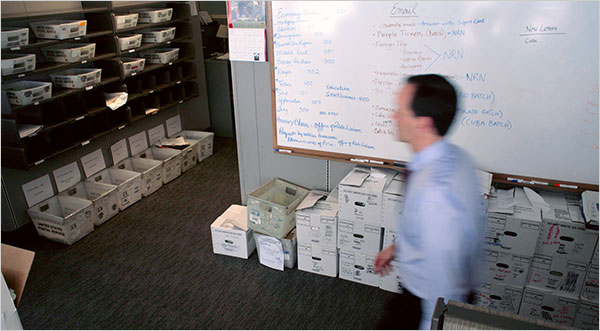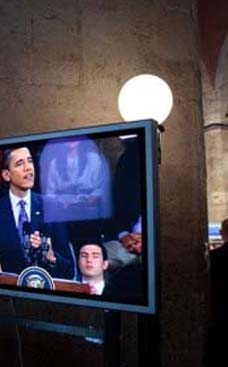
Kelleher chooses 10 letters, which are slipped into a purple folder and put in the daily briefing book that is delivered to President Obama at the White House residence. Designed to offer a sampling of what Americans are thinking, the letters are read by the president, and he sometimes answers them by hand, in black ink on azure paper. “We pick messages that are compelling, things people say that, when you read it, you get a chill,” said Mr. Kelleher, 47. “I send him letters that are uncomfortable messages.” The ritual offers Mr. Obama a way to move beyond the White House bubble, and occasionally leads to moments when his composure cracks, advisers said. “I remember once he was particularly quiet,” said Mr. Obama’s senior adviser, David Axelrod, “and I asked him what he was thinking about, and he said, ‘These letters just tear you up.’ It was after getting a poignant letter from a struggling family.”
Sierra Leone RPCV Mike Kelleher picks ten letters a day that reach Obama
Picking Letters, 10 a Day, That Reach Obama
Caption: Mike Kelleher, the director of the White House Office of Correspondence, uses a white board to keep a rough tally of mail sorted by subject. Photo: Andrew Councill for The New York Times
By ASHLEY PARKE
Published: April 19, 2009
WASHINGTON — The task of keeping a president in touch with his public is daunting, as Mike Kelleher well knows.
Tens of thousands of letters, e-mail messages and faxes arrive at the White House every day. A few hundred are culled and end up each weekday afternoon on a round wooden table in the office of Mr. Kelleher, the director of the White House Office of Correspondence.
He chooses 10 letters, which are slipped into a purple folder and put in the daily briefing book that is delivered to President Obama at the White House residence. Designed to offer a sampling of what Americans are thinking, the letters are read by the president, and he sometimes answers them by hand, in black ink on azure paper.
“We pick messages that are compelling, things people say that, when you read it, you get a chill,” said Mr. Kelleher, 47. “I send him letters that are uncomfortable messages.”
The ritual offers Mr. Obama a way to move beyond the White House bubble, and occasionally leads to moments when his composure cracks, advisers said. “I remember once he was particularly quiet,” said Mr. Obama’s senior adviser, David Axelrod, “and I asked him what he was thinking about, and he said, ‘These letters just tear you up.’ It was after getting a poignant letter from a struggling family.”
Some letters begin “I didn’t vote for you”; others end “May God bless.” One missive came in the form of baseboard molding, covered with $2.70 in stamps and a scrawl urging the president to “Fix housing 1st!” Heaps of letters offer advice on the best treats for the first dog, Bo, and people have sent in colorful dog sweaters.
Mr. Kelleher said the president had used the letters to ask policy questions of government agencies, and Mr. Axelrod recalled a letter circulated among staff members from a woman in Glendale, Ariz., who was in danger of losing her home because her husband had lost his job.
The White House chief of staff, Rahm Emanuel, said Mr. Obama “believes it’s easy in Washington to forget there are real people with real challenges being affected by the debate.” Mr. Emanuel added that he had seen the president turn to policy advisers in meetings and say, “No, no, no. I want to read you a letter that I got. I want you to understand.”
Cynthia Arnold of Stewartstown, Pa., wrote the president to tell him what had happened as she started watching his inauguration on television. Her son, Pvt. Matthew J. Arnold, 23, whose unit might be deployed to the Middle East, called her from Fort Hood, Tex., to ask for her help filling out paperwork.
“He was calling to ask me who should make his funeral arrangements in the event of his death, his father or me,” Mrs. Arnold wrote. “He advised me that it should probably be his father since I could barely make it through the call. He was calling to ask me where he should convalesce in the event of his being injured, there in Texas or at home in Pennsylvania.”
Using enlarged type to make sure the president would “be able to read it,” she urged him to “please make our troops one of your priorities.” A few weeks after she mailed the letter, Mrs. Arnold received a handwritten note from Mr. Obama.
“I will do everything in my power to make troops like Matthew my priority,” the president wrote. “Please tell him ‘thank you for your service’ from his commander in chief!”
He signed the note “Barack Obama,” with a big looping B and O. Mrs. Arnold said she was so overwhelmed that the president had called her son by his first name that she “just burst into tears.” She is storing the letter in a safe deposit box until she can have it framed.
Mr. Kelleher, who has three daughters, later told Mrs. Arnold that the letter had caught his attention because he is a parent.
A graduate of Illinois State University, Mr. Kelleher served in the Peace Corps in Sierra Leone in the mid-1980s. He ran unsuccessfully for Congress in Illinois in 2000, which was when he first crossed paths with Mr. Obama, who also was running for Congress. In 2006, Mr. Kelleher became the director of outreach in Mr. Obama’s Senate office in Chicago.
Describing his current job, Mr. Kelleher talks about each letter’s “character,” the pictures and messages in crayon from children, and the postcard-size notes from older people, written on typewriters that still have a cursive font.
Mr. Kelleher’s office has a red box for what he calls “life-and-death constituent case work.”
“So someone says, ‘I’m despondent and I want to commit suicide,’ or ‘I have a life-threatening illness and I need help here,’ ” Mr. Kelleher said. “We immediately respond to those.” Threats are reported to the Secret Service.
On Inauguration Day, Michael Powers of Pikeville, Tenn., wrote to Mr. Obama, telling him he had lost his father, a three-pack-a-day smoker, to lung cancer in 1979.
“Enclosed is a picture of my father, and I have carried it for almost 30 years now,” wrote Mr. Powers, 54. Seeing images of Mr. Obama with his daughters had made him miss his father “more than I think I ever have.”
“If you always want to be there for your girls,” Mr. Powers urged, “then stop smoking NOW!”
About a month later, Mr. Powers received a reply. After thanking him for “the wonderful letter, and the good advice,” the president wrote, “I am returning the picture, since it must be important to you, but I will remember your dad’s memory.”
On the wall of his sparse office, a few blocks from the White House, Mr. Kelleher has two letters from his daughter Carol, 10. She wrote to him once and, when he did not reply, she wrote “a second, meaner letter,” he said. That letter begins, “I have noticed you did not reply to my letter.”
“So I had to reply to her,” he said, sounding less keeper of the gate and more hapless father, impressed by the power of letters.











